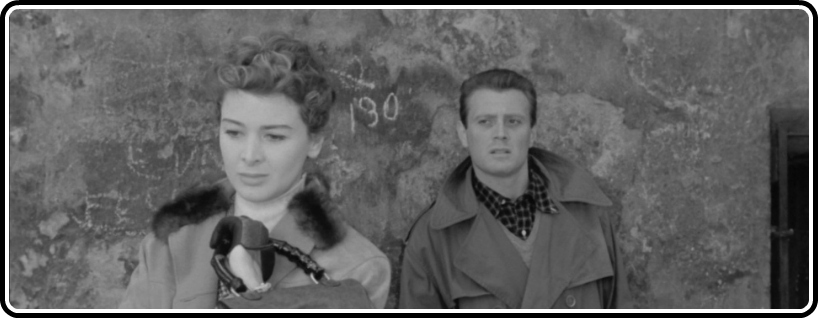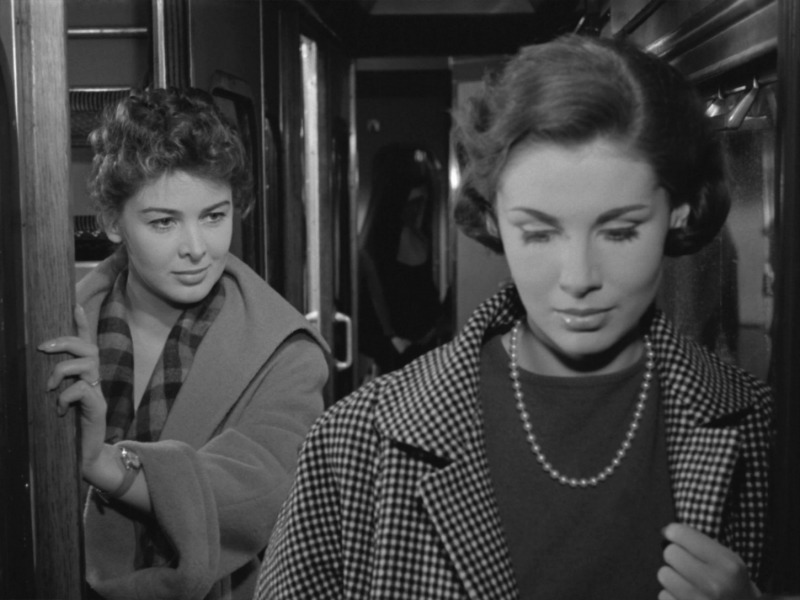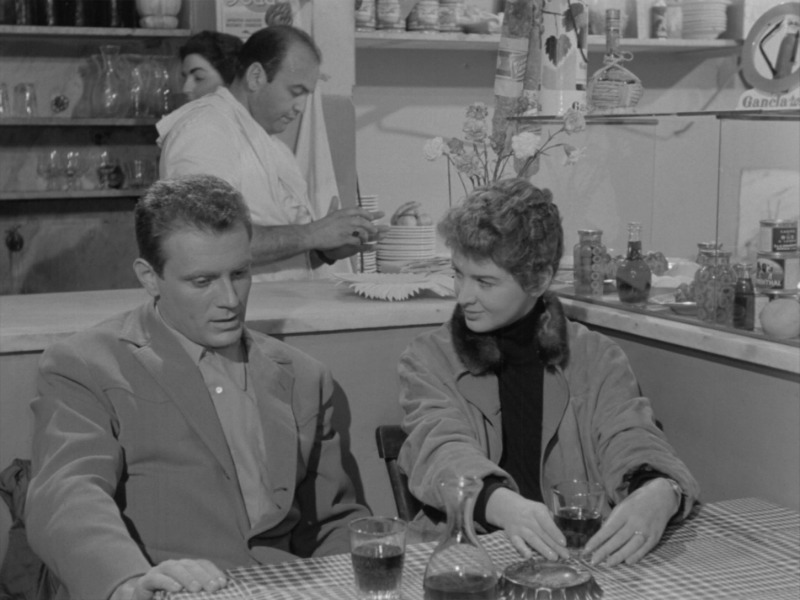
The special features on Masters of Cinema’s wonderful recent release of Le Amiche focus on it as an in-development film. That is to say, having been made in 1955, it falls well before director Michelangelo Antonioni’s most vaunted period (the early 1960s), and isn’t nearly as esoteric as the work that followed. And certainly one could look at it and note aesthetic/thematic concerns of alienation, loneliness, and the impossibility of true human connection that would increasingly consume him, but as true as that may be, it does a disservice to a piece that is in and of itself magnificently accomplished and tremendously moving.
Arriving in Turin to manage a fashion salon (one of those shops you see in so many films of the period, wherein pretty young girls strut out in fancy dresses for older, wealthy women), Clelia (Eleonora Rossi Drago) quickly becomes involved with a clique of bourgeois women after one of their number, Rosetta (Madeleine Fischer), attempts suicide in an adjoining hotel room. Clelia is a fascinating figure in this group, both a part of their world in that she moves in their circles, eats their food, wears their clothes, and operates with roughly the same capital, but distinctly separate in that she had to work for it. The other women, with the exception of one, are mostly still living off (and/or with) their parents. One, Momina, has arranged a luxurious marriage arrangement granting her tremendous autonomy with all the financial benefits of marrying up. They are not what some might term “serious people,” though they take a great many things terribly seriously.
Rosetta, the woman recovering from a suicide attempt, has an understandably difficult time readjusting to daily life, in no small part because her inherited wealth allows her to do very little with her daily life. She spends most of her time pining for an artist, Lorenzo (L’Avventura‘s Gabriele Ferzetti), who yes, painted her portrait and yes, was glimpsed sketching her face in his matchbook, but is married to Nene, the one member of the clique who could be said to have ambitions outside of men and money. She’s a sculpture artist, and quite a successful one at that, much more so than Lorenzo in fact.
In an attempt to distract Rosetta from all of it – the depression, the clique, the Lorenzo – Clelia takes her on as a sales assistant, but people with chronic depression, easy attachment to romantic ideals, and plenty of money to fall back on don’t make for the most reliable employees. Clelia, for her part, can’t quite get her mind off of Carlo (Ettore Manni), an assistant architect overseeing the renovation of the shop she is to take over, but whereas Rosetta can’t quite make time for work amidst men, Clelia’s problem is very much the opposite.

Antonioni is magnificent, as always, at showing how all of this can become very alluring and involved, while still recognizing the inherent silliness without, it must be noted, mocking the women. These are, after all, “real people” (as far as that goes, cinematically), and even though Antonioni was a class-conscious filmmaker (a scene set in a lower-class restaurant is one of the film’s more revelatory in this respect), he had the wisdom to look at wealth as more than a collection of first world problems. He recognized that removing the concern for money from the equation revealed a person’s true preoccupations and concerns. It gets all the gunk out of the way, so to speak.
That it seemed to reveal a vast emptiness says, in his films at least, more about the human condition than the idle rich. From a certain vantage point, it seems like Rosetta’s chief problem is just having too much time on her hands, which would make employment an ideal cure. But constant work hasn’t exactly done wonders for Clelia. She’s definitely improved her station in life, as evidenced when she and Carlo go furniture shopping in her old, dilapidated neighborhood, which coincidentally is where Carlo grew up as well. So her career pursuits have taken her further from the one thing that now makes her happy, and as silly as it may seem, Antonioni is weirdly sympathetic with the class divide between the two of them. The neighborhood isn’t a very nice place to live, particularly contrasted with Clelia’s wardrobe, and in some way she’d be throwing away years of work for potentially fleeting happiness.
This gets to a larger issue in the film, which is the gender divide. Obviously, were Clelia to marry Carlo, she would give up her work and live under his (much lower) salary, not the other way around. This is 1955, and it’s not even Rome – in fact, it’s a town in which, Clelia notes, women spend a lot to look ordinary. There’s little question as to who would be the head of the house. Even in Nene and Lorenzo’s marriage, Nene is more successful but every decision for their relationship and careers defaults to Lorenzo. Much of the reason his eye starts to wander, in fact, seems to come back to his feeling on inadequacy (and it can’t be overstated how perfectly in tune Ferzetti is to Antonioni’s fragility). He can’t measure up against Nene, but put him with someone with nothing going on in her life, and he starts to look okay.
The film’s title translate to “The Girlfriends” in English, which is a bit of quiet irony unusual for the time. The women in the film are friends insofar as they spend an awful lot of time together, confiding their thoughts and feelings, but Antonioni isn’t shy about exploring the gamesmanship and competitions prevalent in so many female friendships. It’s not that they don’t care about one another; they just care about themselves a little bit more.

Presented in its original theatrical aspect ratio of 1.37:1, Masters of Cinema has brought Le Amiche to our screens in a way that can only be described as fan-tabulous. I only had a chance to look at the DVD, which gives me all kinds of delightful dreams of the Blu-ray (they’re both sold together in a dual-format, region-locked edition). I had the good fortune to see this on film a few years back, and was struck then as now by the very light palette, favoring whites and light grays over darker tones. MoC, working from the same restoration by Cineteca di Bologna and the Film Foundation that I saw, brings this vision to wonderful life. Even on the DVD, the presence of genuine film is felt, with tremendous texture and a faintly detectable grain pattern. It really gives new meaning to the “silver screen.” The DVD naturally has some compression, but nothing overly distracting. [The accompanying screencaps for this article come from the Blu-ray edition, courtesy of DVD Beaver]
On the supplemental side, it’s the Gabe Klinger show through and through. Klinger is a film professor and critic out of Chicago, and don’t let his youth fool you – he’s been at this racket awhile yet. In his introduction to the film (lasting around eight-and-a-half minutes), he discusses Le Amiche‘s reputation as “lesser Antonioni,” noting that it didn’t even show in the States until after L’Avventura had knocked the world on its ass, making his earlier film seem smaller by comparison. He rightfully points to the many qualities that make it all its own, as well as how you can find the development of the director’s style.
In a piece called “Antonioni and the Industry” (last ten minutes), Klinger focuses on, as the title suggests, the industrial side, and how Le Amiche represents the filmmaker navigating the tricky, macho-centric waters with his more fragile, thoughtful outlook. He discusses Le Amiche as melodrama, which it absolutely is, and how Antonioni brought the then-still-very-popular genre to his own sensibilities, and vice versa.
Both pieces are well worth watching, though, as I said, each are more focused on Le Amiche‘s role in film history and Antonioni’s development.
MoC also includes a 28-page booklet with “vintage critical pieces,” bits from interviews with Antonioni, and a letter the filmmaker wrote in 1956 to Italo Calvino, a journalist and short story author.
A very good film in a very good home video edition? I’d say that’s a no-brainer, especially for Antonioni fans. And if you’ve yet to be swayed by his majesty, know that this is a developmental work, and as such is a little bit more accessible than your L’Avventura or your Red Desert (or certainly your Zabriskie Point). So any which way you’re coming from, do yourself a favor and pick up Le Amiche.
Order the Le Amiche Dual Format (Blu-ray & DVD) release from Amazon UK



![Bergman Island (The Criterion Collection) [Blu-ray]](https://criterioncast.com/wp-content/uploads/2022/11/bergman-island-the-criterion-collection-blu-ray-400x496.jpg)
![This Is Not a Burial, It’s a Resurrection (The Criterion Collection) [Blu-ray]](https://criterioncast.com/wp-content/uploads/2022/11/this-is-not-a-burial-its-a-resurrection-the-criterion-collection-blu-ray-400x496.jpg)
![Lars von Trier's Europe Trilogy (The Criterion Collection) [The Element of Crime/Epidemic/Europa] [Blu-ray]](https://criterioncast.com/wp-content/uploads/2022/11/lars-von-triers-europe-trilogy-the-criterion-collection-the-element-of-400x496.jpg)
![Imitation of Life (The Criterion Collection) [Blu-ray]](https://criterioncast.com/wp-content/uploads/2022/11/imitation-of-life-the-criterion-collection-blu-ray-400x496.jpg)
![The Adventures of Baron Munchausen (The Criterion Collection) [4K UHD]](https://criterioncast.com/wp-content/uploads/2022/11/the-adventures-of-baron-munchausen-the-criterion-collection-4k-uhd-400x496.jpg)
![Cooley High [Criterion Collection] [Blu-ray] [1975]](https://criterioncast.com/wp-content/uploads/2022/11/cooley-high-criterion-collection-blu-ray-1975-400x496.jpg)